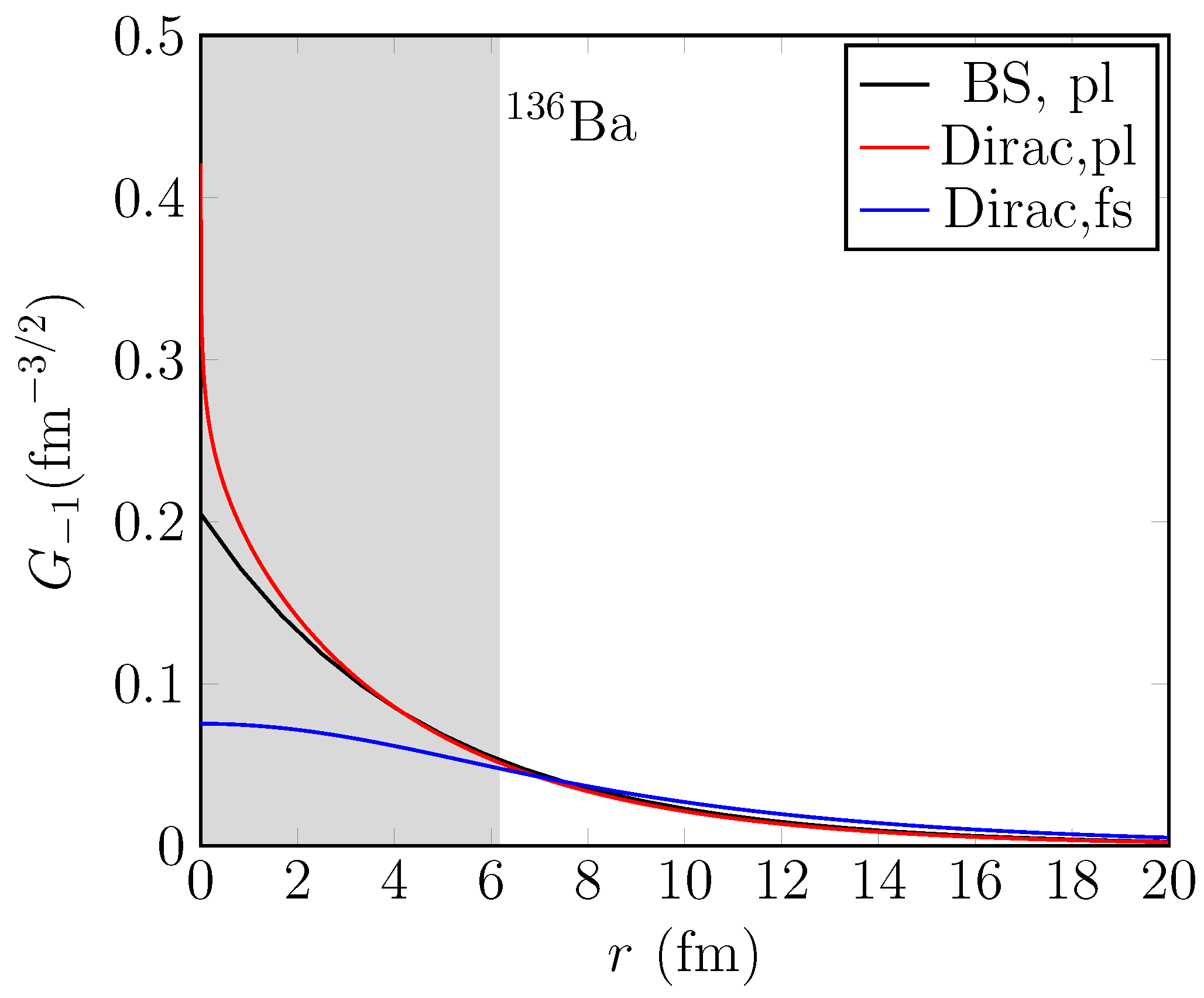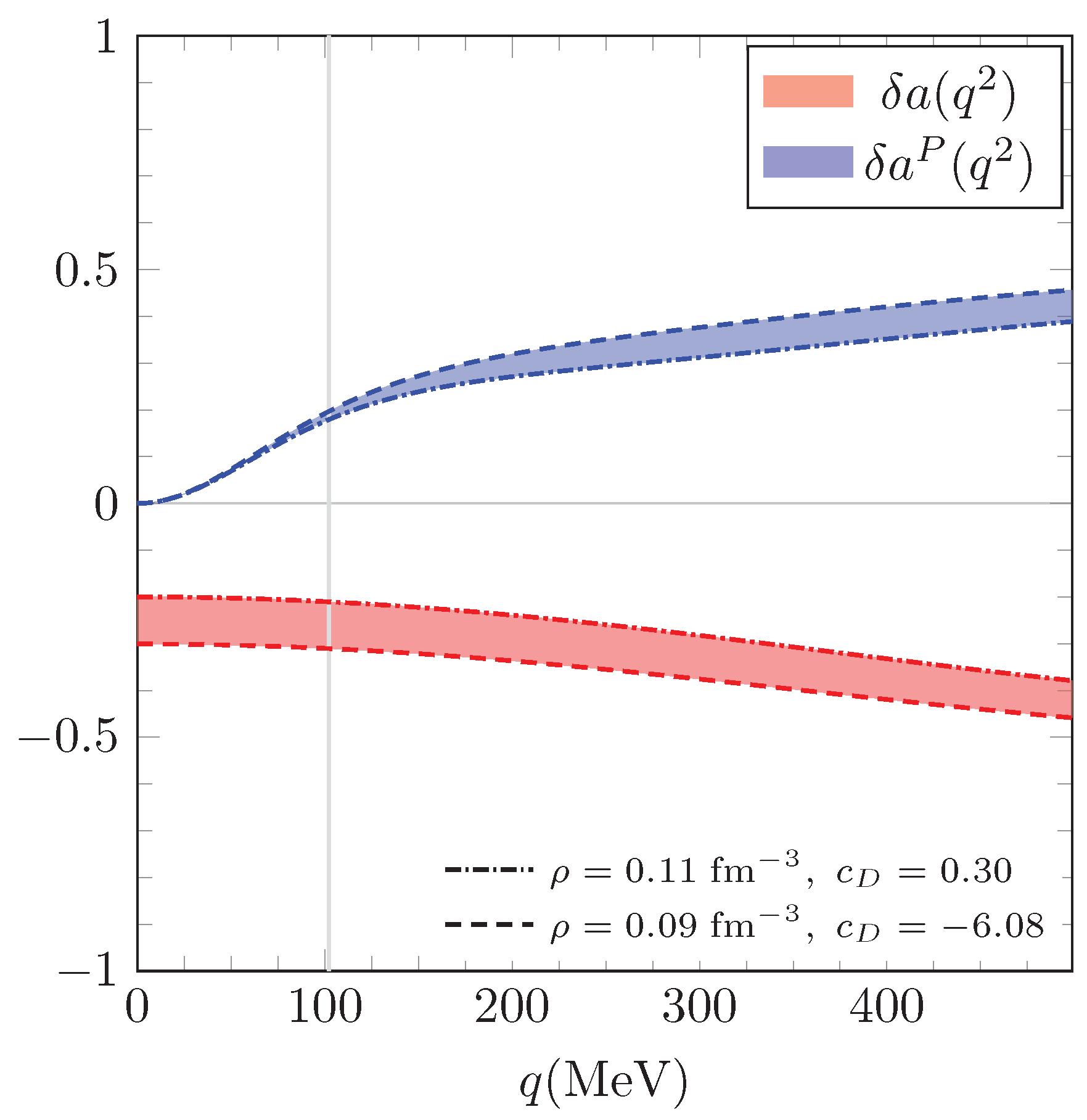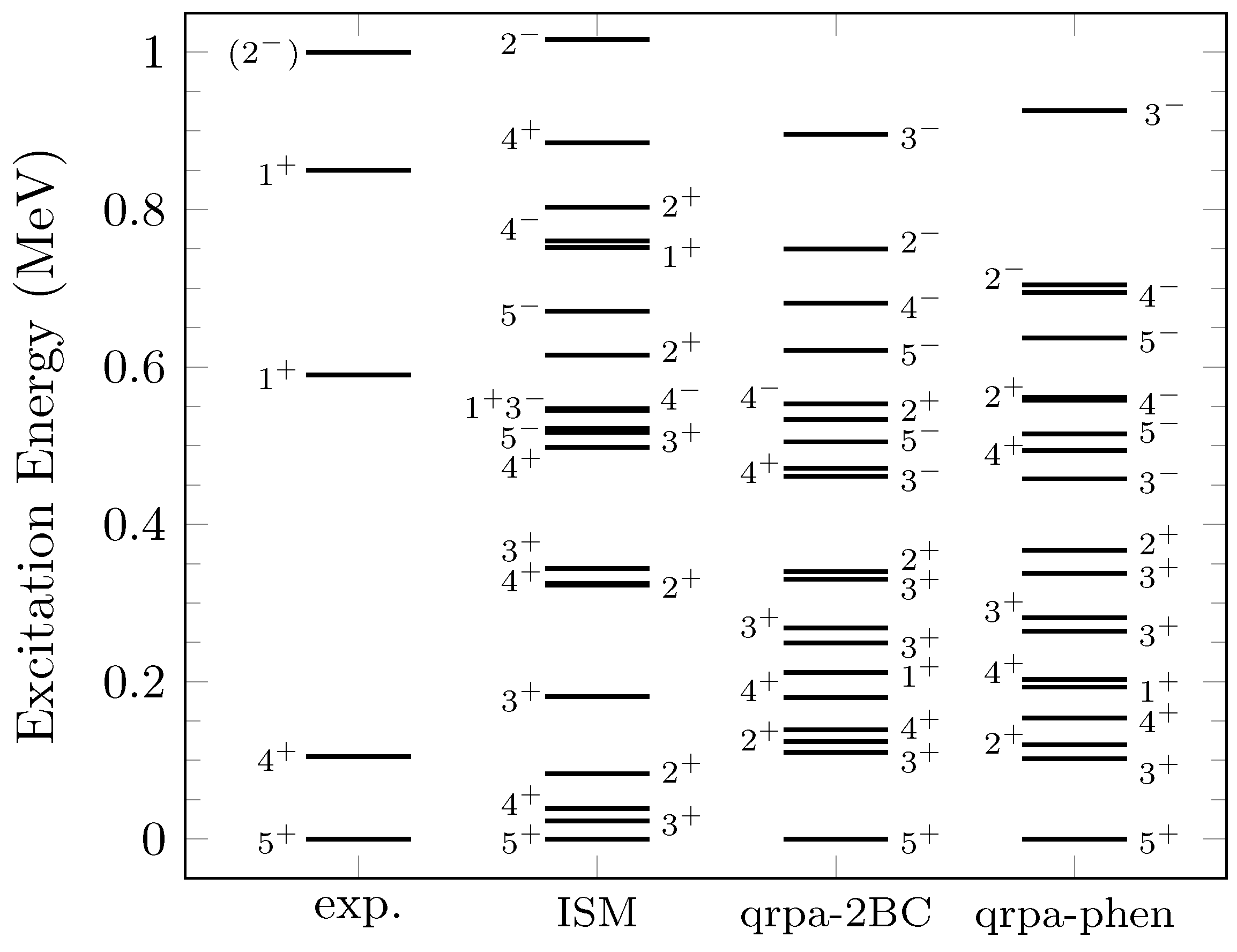Submitted:
25 April 2023
Posted:
25 April 2023
You are already at the latest version
Abstract
Keywords:
1. Introduction
2. Theoretical framework
2.1. Bound-muon s-orbital wave function
2.2. Muon-capture rates
2.3. Chiral two-body currents
2.4. Many-body methods
3. Results and discussion
- sm-2BC:
- sm-phen:
- qrpa-2BC:
- We use the pnQRPA method as described in Section 2.4 and quench and by the 2BC using Equations (8) and (9). We use the PIR scheme and adjust the isoscalar strength to a value in order to achieve the partial isospin restoration and then we adjust the isoscalar strength to the values in order to reproduce the TNDBD half-life yr [41] using the effective coupling corresponding to the free-nucleon value quenched by the zero-momentum-transfer correction through Equation (8) with parameters .
- qrpa-phen:
- Again, we use the pnQRPA method like above but use as the particle-particle strength the value obtained from the extensive survey of the -decay and TNDBD half-lives within the mass range in [42]. We adopt the effective coupling resulting from the so-called linear model of the same work. This value is somewhat below the range of values corresponding to the axial-vector correction at zero-momentum transfer. The corresponding effective pseudoscalar coupling is as obtained through the Goldberger-Treiman relation (7). The value can be considered to account for both the missing two-body currents at MeV and the deficiencies of the many-body approach in the spirit of [14]. However, it does not take into account the momentum dependence of the two-body currents.
4. Conclusions
Author Contributions
Funding
Data Availability Statement
Conflicts of Interest
References
- Suhonen, J.; Civitarese, O. Weak-interaction and nuclear-structure aspects of nuclear double beta decay. Physics Reports 1998, 300, 123–214. [Google Scholar] [CrossRef]
- Vergados, J.D.; Ejiri, H.; Šimkovic, F. Neutrinoless double beta decay and neutrino mass. Int. J. Mod. Phys. E 2016, arXiv:hep-ph/1612.02924]25, 1630007. [Google Scholar] [CrossRef]
- Engel, J.; Menéndez, J. Status and future of nuclear matrix elements for neutrinoless double-beta decay: a review. Reports on Progress in Physics 2017, 80, 046301. [Google Scholar] [CrossRef] [PubMed]
- Ejiri, H.; Suhonen, J.; Zuber, K. Neutrino-nuclear responses for astro-neutrinos, single beta decays and double beta decays. Physics Reports 2019, 797. [Google Scholar] [CrossRef]
- Agostini, M.; Benato, G.; Detwiler, J.A.; Menéndez, J.; Vissani, F. 2022; arXiv:hep-ex/2202.01787].
- Caurier, E.; Nowacki, F.; Poves, A.; Retamosa, J. Shell Model Studies of the Double Beta Decays of 76Ge, 82Se, and 136Xe. Phys. Rev. Lett. 1996, 77, 1954–1957. [Google Scholar] [CrossRef]
- Caurier, E.; Menéndez, J.; Nowacki, F.; Poves, A. Influence of Pairing on the Nuclear Matrix Elements of the Neutrinoless ββ Decays. Phys. Rev. Lett. 2008, 100, 052503. [Google Scholar] [CrossRef]
- Caurier, E.; Nowacki, F.; Poves, A. Shell Model description of the ββ decay of 136Xe. Physics Letters B 2012, 711, 62–64. [Google Scholar] [CrossRef]
- Horoi, M.; Brown, B.A. Shell-Model Analysis of the 136Xe Double Beta Decay Nuclear Matrix Elements. Phys. Rev. Lett. 2013, 110, 222502. [Google Scholar] [CrossRef]
- Suhonen, J.; Civitarese, O. Double-beta-decay nuclear matrix elements in the QRPA framework. Journal of Physics G: Nuclear and Particle Physics 2012, 39, 085105. [Google Scholar] [CrossRef]
- Märkisch, B.; Mest, H.; Saul, H.; Wang, X.; Abele, H.; Dubbers, D.; Klopf, M.; Petoukhov, A.; Roick, C.; Soldner, T.; Werder, D. Measurement of the Weak Axial-Vector Coupling Constant in the Decay of Free Neutrons Using a Pulsed Cold Neutron Beam. Phys. Rev. Lett. 2019, 122, 242501. [Google Scholar] [CrossRef]
- Suhonen, J.T. Value of the Axial-Vector Coupling Strength in β and ββ Decays: A Review. Frontiers in Physics 2017, 5. [Google Scholar] [CrossRef]
- Menéndez, J.; Gazit, D.; Schwenk, A. Chiral Two-Body Currents in Nuclei: Gamow-Teller Transitions and Neutrinoless Double-Beta Decay. Physical Review Letters 2011, 107. [Google Scholar] [CrossRef]
- Gysbers, P.; Hagen, G.; Holt, J.; Jansen, G.; Morris, T.; Navrátil, P.; Papenbrock, T.; Quaglioni, S.; Schwenk, A.; Stroberg, S.; Wendt, K. Discrepancy between experimental and theoretical β-decay rates resolved from first principles. Nature Physics 2019, 15, 1. [Google Scholar] [CrossRef]
- Morita, M.; Fujii, A. Theory of Allowed and Forbidden Transitions in Muon Capture Reactions. Phys. Rev. 1960, 118, 606–618. [Google Scholar] [CrossRef]
- Jokiniemi, L.; Miyagi, T.; Stroberg, S.R.; Holt, J.D.; Kotila, J.; Suhonen, J. Ab initio calculation of muon capture on 24Mg. Phys. Rev. C 2023, 107, 014327. [Google Scholar] [CrossRef]
- Kortelainen, M.; Suhonen, J. Ordinary muon capture as a probe of virtual transitions of ββ decay. Europhysics Letters 2002, 58, 666. [Google Scholar] [CrossRef]
- Kortelainen, M.; Suhonen, J. Nuclear muon capture as a powerful probe of double-beta decays in light nuclei. Journal of Physics G: Nuclear and Particle Physics 2004, 30, 2003. [Google Scholar] [CrossRef]
- Siiskonen, T.; Hjorth-Jensen, M.; Suhonen, J. Renormalization of the weak hadronic current in the nuclear medium. Phys. Rev. C 2001, 63, 055501. [Google Scholar] [CrossRef]
- Jokiniemi, L.; Suhonen, J. Comparative analysis of muon-capture and 0νββ-decay matrix elements. Phys. Rev. C 2020, 102, 024303. [Google Scholar] [CrossRef]
- Asakura, K.; others. Search for double-beta decay of 136Xe to excited states of 136Ba with the KamLAND-Zen experiment. Nucl. Phys. A 2016, arXiv:hep-ex/1509.03724]946, 171–181. [Google Scholar] [CrossRef]
- Albert, J.B.; Anton, G.; Badhrees, I.; Barbeau, P.S.; Bayerlein, R.; Beck, D.; Belov, V.; Breidenbach, M.; Brunner, T.; Cao, G.F.; Cen, W.R.; Chambers, C.; Cleveland, B.; Coon, M.; Craycraft, A.; Cree, W.; Daniels, T.; Danilov, M.; Daugherty, S.J.; Daughhetee, J.; Davis, J.; Delaquis, S.; Der Mesrobian-Kabakian, A.; DeVoe, R.; Didberidze, T.; Dilling, J.; Dolgolenko, A.; Dolinski, M.J.; Fairbank, W.; Farine, J.; Feyzbakhsh, S.; Fierlinger, P.; Fudenberg, D.; Gornea, R.; Graham, K.; Gratta, G.; Hall, C.; Hansen, E.V.; Hoessl, J.; Hufschmidt, P.; Hughes, M.; Jamil, A.; Jewell, M.J.; Johnson, A.; Johnston, S.; Karelin, A.; Kaufman, L.J.; Koffas, T.; Kravitz, S.; Krücken, R.; Kuchenkov, A.; Kumar, K.S.; Lan, Y.; Leonard, D.S.; Li, G.S.; Li, S.; Licciardi, C.; Lin, Y.H.; MacLellan, R.; Michel, T.; Mong, B.; Moore, D.; Murray, K.; Nelson, R.; Njoya, O.; Odian, A.; Ostrovskiy, I.; Piepke, A.; Pocar, A.; Retière, F.; Rowson, P.C.; Russell, J.J.; Schmidt, S.; Schubert, A.; Sinclair, D.; Stekhanov, V.; Tarka, M.; Tolba, T.; Tsang, R.; Vogel, P.; Vuilleumier, J.L.; Wagenpfeil, M.; Waite, A.; Walton, T.; Weber, M.; Wen, L.J.; Wichoski, U.; Wrede, G.; Yang, L.; Yen, Y.R.; Zeldovich, O.Y.; Zettlemoyer, J.; Ziegler, T. Search for Neutrinoless Double-Beta Decay with the Upgraded EXO-200 Detector. Phys. Rev. Lett. 2018, 120, 072701. [Google Scholar] [CrossRef]
- Shimizu, I.; Chen, M. Double Beta Decay Experiments With Loaded Liquid Scintillator. Frontiers in Physics 2019, 7. [Google Scholar] [CrossRef]
- Kharusi, S.; Anton, G.; Badhrees, I.; Barbeau, P.; Beck, D.; Belov, V.; Bhatta, T.; Breidenbach, M.; Brunner, T.; Cao, G.; Cen, W.; Chambers, C.; Cleveland, B.; Coon, M.; Craycraft, A.; Daniels, T.; Darroch, L.; Daugherty, S.; Davis, J.; Ziegler, T. Search for Majoron-emitting modes of Xe 136 double beta decay with the complete EXO-200 dataset. Physical Review D 2021, 104. [Google Scholar] [CrossRef]
- The MONUMENT Collaboration, see the Contribution List of the MEDEX’22 Workshop, Prague, Czech Republic, -17, 2022. https://indico.utef.cvut.cz/event/32/contributions. 13 June.
- Bethe, H.; Salpeter, E. Quantum Mechanics of One- and Two-Electron Atoms; Academic Press, New York, 1959.
- Jokiniemi, L.; Suhonen, J.; Ejiri, H.; Hashim, I. Pinning down the strength function for ordinary muon capture on 100Mo. Physics Letters B 2019, 794, 143–147. [Google Scholar] [CrossRef]
- Jokiniemi, L.; Suhonen, J. Muon-capture strength functions in intermediate nuclei of 0νββ decays. Phys. Rev. C 2019, 100, 014619. [Google Scholar] [CrossRef]
- Hoferichter, M.; Menéndez, J.; Schwenk, A. Coherent elastic neutrino-nucleus scattering: EFT analysis and nuclear responses. Phys. Rev. D 2020, 102, 074018. [Google Scholar] [CrossRef]
- Klos, P.; Menéndez, J.; Gazit, D.; Schwenk, A. Large-scale nuclear structure calculations for spin-dependent WIMP scattering with chiral effective field theory currents. Phys. Rev. D 2013, 88, 083516. [Google Scholar] [CrossRef]
- Jokiniemi, L.; Romeo, B.; Soriano, P.; Menéndez, J. Neutrinoless ββ-decay nuclear matrix elements from two-neutrino ββ-decay data. Physical Review C 2022, arXiv:nucl-th/2207.05108]107, 044305. [Google Scholar] [CrossRef]
- Caurier, E.; Martínez-Pinedo, G.; Nowacki, F.; Poves, A.; Zuker, A.P. The shell model as a unified view of nuclear structure. Rev. Mod. Phys. 2005, 77, 427–488. [Google Scholar] [CrossRef]
- Suhonen, J. From Nucleons to Nucleus: Concepts of Microscopic Nuclear Theory; Theoretical and Mathematical Physics, Springer: Berlin, Germany, 2007. [Google Scholar] [CrossRef]
- Brown, B.A.; Stone, N.J.; Stone, J.R.; Towner, I.S.; Hjorth-Jensen, M. Magnetic moments of the 21+ states around 132Sn. Phys. Rev. C 2005, 71, 044317. [Google Scholar] [CrossRef]
- Brown, B.; Rae, W. The Shell-Model Code NuShellX@MSU. Nuclear Data Sheets 2014, 120, 115–118. [Google Scholar] [CrossRef]
- Jokiniemi, L.; Ejiri, H.; Frekers, D.; Suhonen, J. Neutrinoless ββ nuclear matrix elements using isovector spin-dipole Jπ=2- data. Phys. Rev. C 2018, 98, 024608. [Google Scholar] [CrossRef]
- Bohr, A.; Mottelson, B.R. Nuclear Structure; Vol. I, Benjamin: New York, 1969. [Google Scholar]
- Suhonen, J.; Taigel, T.; Faessler, A. pnQRPA calculation of the β+/EC quenching for several neutron-deficient nuclei in mass regions A = 94–110 and A =146–156. Nuclear Physics A 1988, 486, 91–117. [Google Scholar] [CrossRef]
- Holinde, K. Two-nucleon forces and nuclear matter. Physics Reports 1981, 68, 121–188. [Google Scholar] [CrossRef]
- Šimkovic, F.; Rodin, V.; Faessler, A.; Vogel, P. 0νββ and 2νββ nuclear matrix elements, quasiparticle random-phase approximation, and isospin symmetry restoration. Phys. Rev. C 2013, 87, 045501. [Google Scholar] [CrossRef]
- Barabash, A. Precise Half-Life Values for Two-Neutrino Double-β Decay: 2020 review. Universe 2020, 6, 159. [Google Scholar] [CrossRef]
- Pirinen, P.; Suhonen, J. Systematic approach to β and 2νββ decays of mass A=100-136 nuclei. Phys. Rev. C 2015, 91, 054309. [Google Scholar] [CrossRef]
- ENSDF database. http://www.nndc.bnl.gov/ensdf/.
- Suzuki, T.; Measday, D.F.; Roalsvig, J.P. Total nuclear capture rates for negative muons. Phys. Rev. C 1987, 35, 2212–2224. [Google Scholar] [CrossRef]
- The MONUMENT collaboration. Work in progress.
| 1 | Note: in the present work we use the convention for compactness of presentation. |



| sm-1BC and sm-2BC | sm-phen | qrpa-1BC | qrpa-2BC | qrpa-phen | |||
|---|---|---|---|---|---|---|---|
| - | - | 0.69 | 0.65 | 0.67 | 0.7 | ||
| - | - | 0.86 | 0.86 | 0.86 | 0.7 | ||
| - | - | 1.18 | 1.18 | 1.18 | 1.18 | ||
| 1.27 | 0.93 | 1.27 | 1.27 | 1.27 | 0.83 | ||
| 6.8 | 6.8 | 6.8 | 6.8 | 6.8 | 6.8 | ||
| 0.09 | 0.11 | - | - | 0.09 | 0.11 | - | |
| -6.08 | 0.30 | - | - | -6.08 | 0.30 | - | |
| OMC Rate | ||||
|---|---|---|---|---|
| E(MeV) | sm-1BC | sm-2BC | sm-phen | |
| 0.000 | 0.0647 | 0.0661 (0.0836) | 0.0433 | |
| 0.023 | 4.02 | 2.75 (3.36) | 2.60 | |
| 0.039 | 1.50 | 1.36 (1.40) | 1.37 | |
| 0.083 | 10.6 | 5.62 (6.99) | 6.18 | |
| 0.181 | 12.0 | 6.24 (8.08) | 6.66 | |
| 0.225 | 20.1 | 12.8 (15.00) | 13.7 | |
| 0.244 | 4.94 | 2.48 (3.23) | 2.71 | |
| 0.323 | 5.83 | 3.50 (4.17) | 3.78 | |
| 0.498 | 6.00 | 4.34 (4.83) | 4.54 | |
| 0.517 | 31.2 | 16.8 (21.5) | 17.9 | |
| 0.522 | 0.645 | 0.371 (0.451) | 0.404 | |
| 0.545 | 16.1 | 8.85 (11.0) | 9.73 | |
| 0.545 | 9.01 | 4.67 (6.03) | 5.03 | |
| 0.547 | 24.0 | 13.0 (16.7) | 13.7 | |
| 0.615 | 18.2 | 12.5 (14.2) | 13.2 | |
| 0.671 | 0.251 | 0.190 (0.208) | 0.198 | |
| 0.752 | 0.285 | 0.123 (0.163) | 0.146 | |
| 0.760 | 2.22 | 1.31 (1.65) | 1.32 | |
| 0.803 | 2.49 | 1.74 (1.95) | 1.83 | |
| 0.885 | 0.143 | 0.0865 (0.103) | 0.0933 | |
| 1.016 | 78.6 | 41.5 (53.3) | 44.4 | |
| Sum | 248 | 140 (174) | 150 | |
| OMC Rate | |||||
|---|---|---|---|---|---|
| E(MeV) qrpa-2BC | E(MeV) qrpa-phen | qrpa-1BC | qrpa-2BC | qrpa-phen | |
| 133 | |||||
| 443 | 207 | ||||
| 156 | |||||
| Sum | 1103 | 592 | |||
Disclaimer/Publisher’s Note: The statements, opinions and data contained in all publications are solely those of the individual author(s) and contributor(s) and not of MDPI and/or the editor(s). MDPI and/or the editor(s) disclaim responsibility for any injury to people or property resulting from any ideas, methods, instructions or products referred to in the content. |
© 2023 by the authors. Licensee MDPI, Basel, Switzerland. This article is an open access article distributed under the terms and conditions of the Creative Commons Attribution (CC BY) license (https://creativecommons.org/licenses/by/4.0/).





